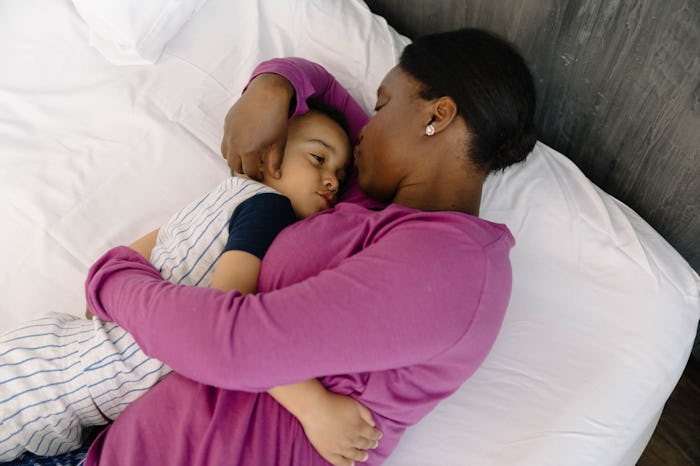Life
How To Tell The Difference Between A Sleep Regression & Separation Anxiety
Is your toddler fighting naps, again? Does your little one cry when you leave their bedroom at night? Maybe, if they are anything like my son, they won't let anyone put them to bed except you (which is so hard when mom needs a night off). If any of the aforementioned sounds familiar, I wouldn't be surprised if you're evaluating your bedtime situation and asking yourself, "Is this a sleep regression or separation anxiety?" Oh, the joys of parenthood, right? Well, according to experts and even though they are two different issues, a sleep regression and separation anxiety can happen at the time time and may require the same parenting strategies to see your baby through.
Firs thing's first: what is a sleep regression, anyway? According to The Baby Sleep Site, a sleep regression is "a period of time (anywhere from 1 – 4 weeks) when a baby or toddler who has been sleeping well suddenly starts waking at night, and/or skipping naps (or waking early from naps) for no apparent reason." According to the same site, regressions are generally related to your child meeting a developmental milestone, like crawling, walking, or feeding themselves.
So, how is separation anxiety different from a sleep regression? According to the Sleep Lady, Kim West, a Licensed Clinical Social Worker (LCSW-C), separation anxiety is part of an important developmental milestone, called object permanence, or recognizing different faces and places. Your baby "suddenly understands that when you leave the room, you don’t disappear like a game of peek-a-boo. Suddenly, [your child] is hit with the realization that you can go somewhere without [them]." The thought of you leaving can be pretty overwhelming and, as a result, can cause anxiety.
According to the American Academy of Pediatrics (AAP), separation anxiety can impact your child's sleep in multiple ways. The AAP site goes on to say, "a baby or toddler may wake several times during the night and call out for his parents. An older toddler may try to climb out of his crib or plead to sleep in your bed." The Sleep Lady agrees and, according to her website, separation anxiety can cause sleep regressions at bed and nap time when your child is between 6 months and 2 years old.
Whether your child's sleep troubles are caused by separation anxiety or a sleep regression, the expert advice about what to do when faced with either is pretty similar. According to the Sleep Lady, "babies thrive on consistency." She adds that it's important not to give in and let your baby or toddler sleep with you, which might help in the short term but can create long-term sleeping habits that are hard to break. Instead, "When your baby wakes or climbs out of bed, gently return her to bed (or lay her in the crib), making it clear that it’s sleepy time."
If you think that your child's sleep issue has to do with separation anxiety and you not being there when your baby and/or child wakes up in the middle of the night, the AAP advises you to play games like peek-a-boo and hide and seek to reinforce the idea that you will always return. The AAP also suggests parents consistently take the time to explain absences to their children. West agrees, adding that parents should "consider introducing a lovey or transitional object that you’ve slept with for a few nights" to comfort your child.
The key is to correctly identify what your child is currently dealing with, whether it be a regression or separation anxiety, and take concrete steps in letting them know you're there throughout the entire process, regardless. Then maybe, just maybe, everyone can get some sleep.
